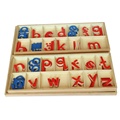 Montessori Principles
Montessori Principles
Dr. Maria Montessori (1870-1952) was one of the first woman physicians in Italy. Her work led her to closely observe the behavior of children. The principles that follow are based on Maria Montessori’s writings and observations and have been adopted by the American Montessori Society (AMS) as key concepts in preparing children for life in the 21st century. The aim of Montessori education is to foster autonomy, competence, agency, and to develop responsible, adaptive citizens who are lifelong learners, compassionate toward others, problem identifiers, and problem solvers.
1) Montessori classrooms are environments where learning occurs in an inquisitive, cooperative, nurturing atmosphere. Students increase their own knowledge by engaging in child-directed work, using a combination of self-correcting material, exploration, collaboration, and teacher-initiated experiences. A Montessori classroom is less teacher-centric than a traditional classroom.
2) Montessori environments enable learning to take place through the senses. Students learn through manipulating materials and interacting with others. These meaningful experiences are precursors to the abstract understanding of ideas. Hands-on materials in a classroom are designed to attract the child, stimulate academic exploration, and develop critical thinking.
3) Classrooms are multi-age by design. The infants are 3 months to 18 months. Toddlers are 18 months to 36 months. Early Childhood are 3 years to 6 years. Self-initiative, collaboration, compassion, and problem-solving skills, along with a “growth mindset” are practiced in a safe, supportive, and healthy atmosphere with mixed age children of varying levels of skills and experience, to help support learning without judgment and an acceptance of diversity and learning styles.
4) The individual is considered as a whole. The physical, emotional, social, aesthetic, and cognitive needs are all considered essential to the developing human.
5) The child learns respect of self, others, the environment, and life, all as a necessary expression of developing a caring attitude toward all people and the planet.
When you come to MCC, you can see the differences in the Montessori approach to the whole child in the classrooms, on the playground, during meals, and even at home, as children care for themselves, for each other, and for the world around them. Every classroom has been intentionally designed to support child-directed learning through freedom of movement, freedom of choice, the development of independence, and a growing awareness of others in the community. The beauty and simplicity of the classroom materials and furnishings combined with the overall design of MCC makes this a welcoming, peaceful environment for children to explore, learn, connect, and grow. From the moment they enter the Montessori Children’s Center, even if they arrive at the very young age of 3 months, to the time they leave us, the children experience the gift of time to develop at their own pace and explore the rich, nurturing environments we have carefully prepared for them.
Even from the youngest age, children experience the joy and delight of discovery. As they mature and develop our programs move along with them. Developing the qualities of agency, empathy, self-discipline, and independence are essential aspects of Montessori education and we work each day to assist the children in our care to move toward those goals. As Dr. Maria Montessori said: “Education is a natural process carried out by the human individual, and is acquired not by listening to words, but by experiences in the environment.”
We hope you will see the value in having children practice these skills at home. We ask parents to practice the concepts of freedom within limits and encourage children to be independent and do as much as possible that they are capable of, including walking to and from Montessori Children’s Center once they can walk, and take responsibilities at home: choosing their own clothes, setting the table, helping with laundry, unloading the car, working in the garden, watering plants, feeding pets, etc., thus participating, and supporting their life at home as active contributors from a very young age.
